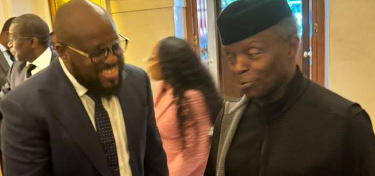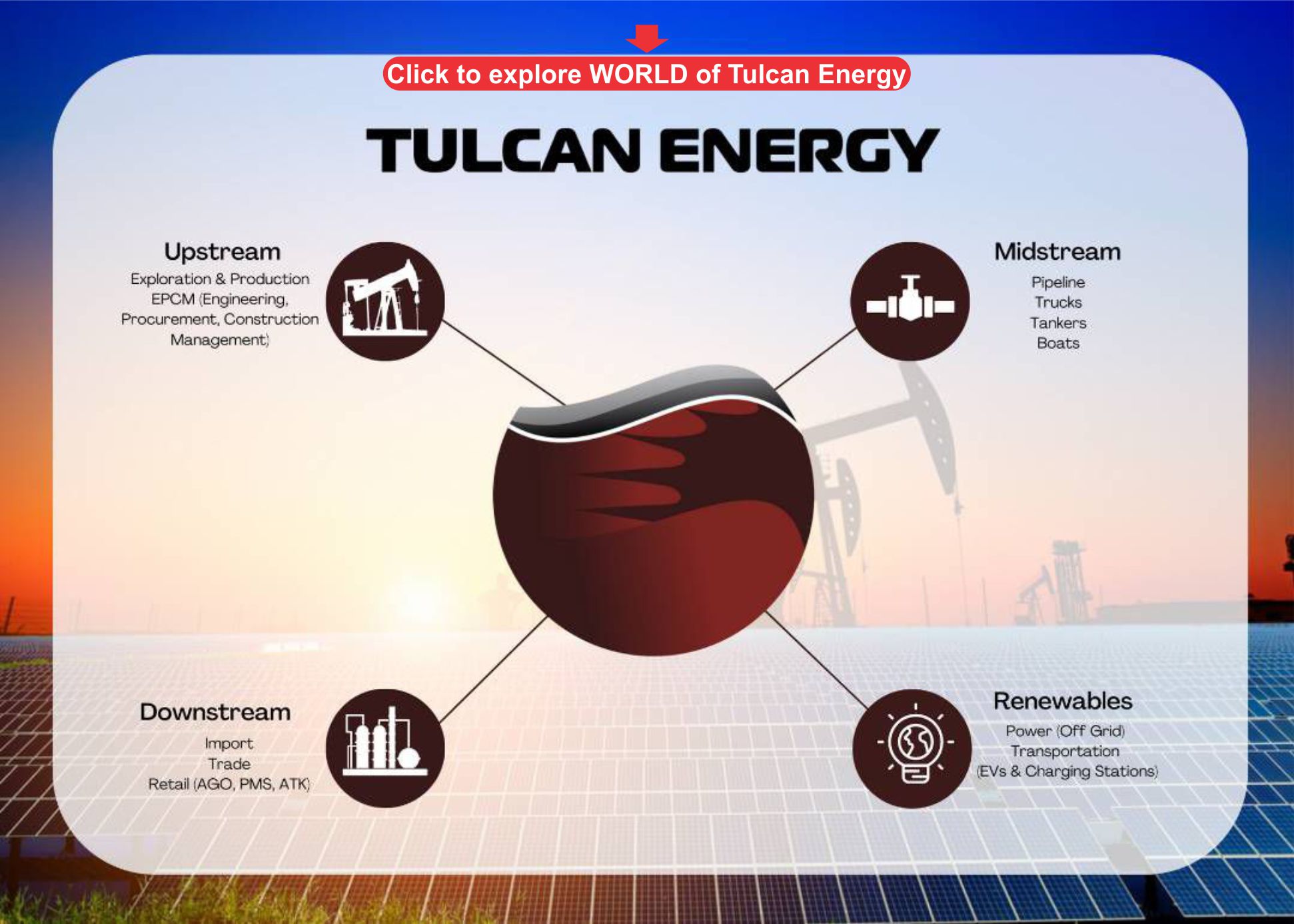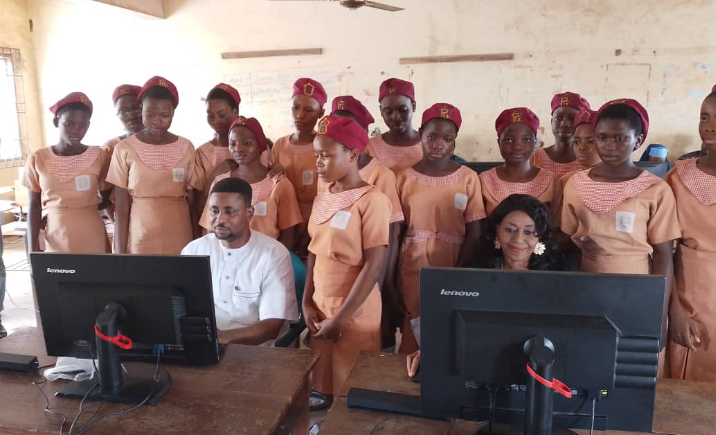Image caption: Dr Tayo Adiatu (left) with former Nigeria’s Vice President Professor Yemi Osinbajo
Tulcan Energy boss Tayo Adiatu charges African govts on formulation of right policies on ‘clean energy’ at London forum
Femi OGUNLANA
Advertisement
Dr Tayo Adeyemi Adiatu has emphasized transition to clean energy is the way forward, urging Nigeria and other African countries to formulate right policies on its technology towards full adoption.
Dr. Adiatu, Chief Executive Officer of Tulcan Energy Resources Ltd, made this declaration Friday while speaking at the 2024 Africa Economic Development Forum in London, United Kingdom.
The event held at The Lanesborough London, with theme, “Africa: Shaping the energy frontier,” had other guest speakers – chairpersons and CEOs of African and non-African institutions in oil and gas, manufacturing, bank and non-banking institutions, etc, including Prof Yemi Osinbajo, former Vice President of Nigeria (Guest of Honour/ Keynote Speaker), who spoke on sustainable energy investment in Africa; Prof. Okey Oramah, President and Chairman Afreximbank; Joel Popoola, Chair, IOD Africa Group; Mojisola Huponu-Wusu, founder, Woodhall Capital; Fabio Ferrari, CEO, aDryada SA; Lamon Rutten, Board Director, Ajlan Group; and Olusegun Ademuwagun Group CEO, Noblesse Energy.
Advertisement
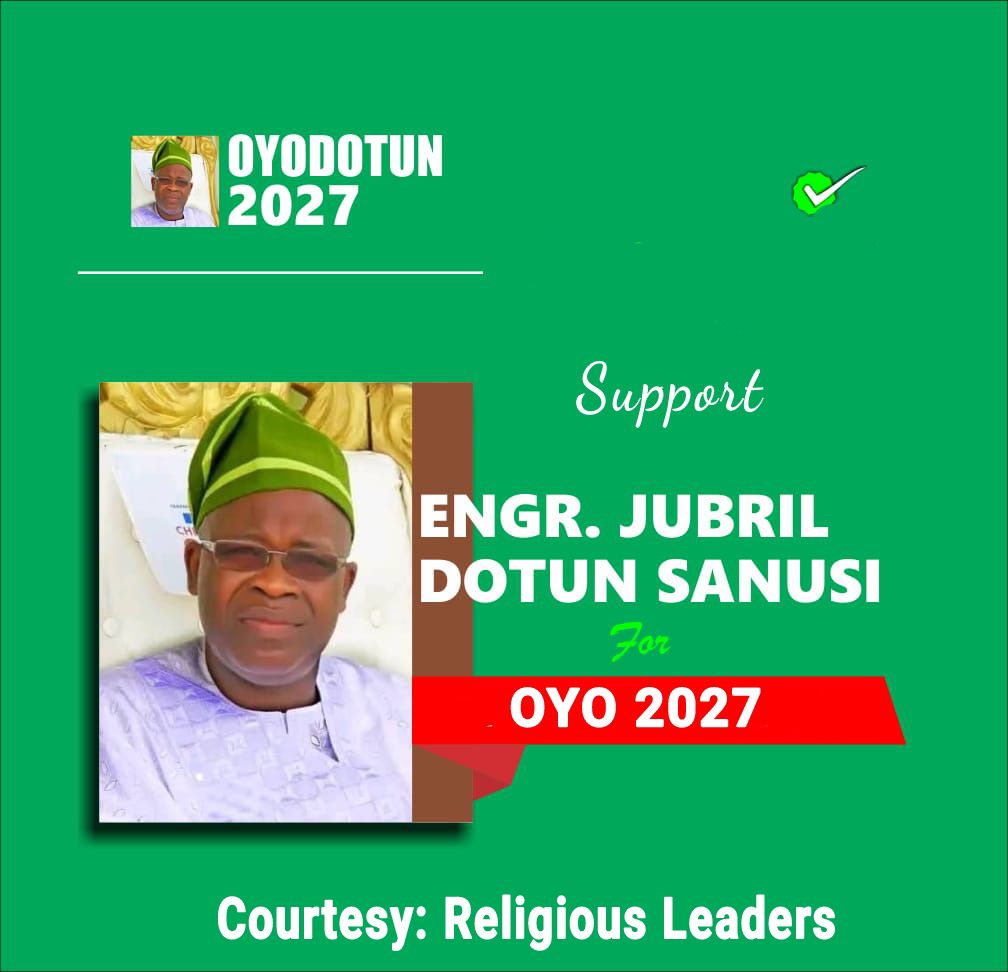
Advertisement

Adiatu, who also was involved in panel discussions on the topics, “Africa’s energy development beyond fossil fuels” and “Opportunities in the sustainable energy sector,” along with Lamon Rutten, CEO of Ajlan Brothers (as panel chairman), O. Paul Andrew, BlackPace Energies; and Dr Akinwole Omoboriowo, Genesis Energy; laid emphasis on migration to the friendly and renewable energy built on solar, wind and so on.
Adiatu underscoring the importance of energy when he opened his speech with “Let there be light,” line, asserted it had now become imperative for Nigeria and Africa to “strike a balance between sustainability, growth, and equity in energy access” and upgrade “to meet future energy demands without being left behind by global transitions.”
Related Posts:
- Tayo Adiatu bags New Telegraph’s Young Entrepreneur Award
- Meet The Boss: Dr ‘Tayo Adeyemi Adiatu’s Influence On Energy, Aviation And Real Estate
He pointed out, “The world is undergoing a profound shift – in how energy is produced, distributed, and consumed. This transition, driven by climate change, technological advancement, and economic imperatives, is reshaping industries and redefining the geopolitics of energy. However, we must recognize that this shift comes with its attendant challenges.”
Advertisement
Advertisement
Underlining that reducing greenhouse gas (GHG) emissions is a challenge, he maintained that adopting cleaner energy and seeing to how electricity is generated and distributed remain critical.
He noted on a global scale more than 60% of electricity is still generated by fossil fuels (coal and natural gas), saying this must be scaled down in view of its limitations.
Adiatu meanwhile enthused that clean energy is increasingly being adopted, with attendant reducing cost of acquisition. “Over the past decade, the costs associated with clean energy technologies have plummeted. Solar panel prices have dropped by over 40%, and battery costs-essential for energy storage have followed a similar trajectory. Clean energy is not just becoming viable; it is becoming competitive. On level playing field, clean energy wins on cost and efficiency, and it will increasingly dominate the energy landscape in the future,” he stated.
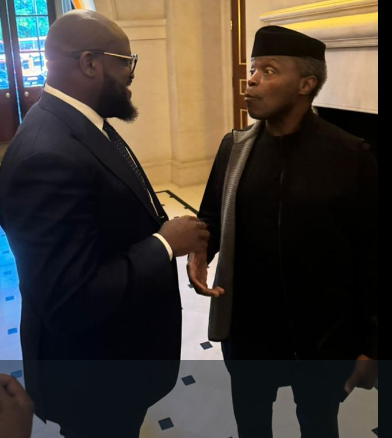
Emphasizing the challenge fossil fuel poses is enormous and unsustainable in view of costs and climate change effect giving rise to rising sea levels, extreme weather events, and biodiversity loss, as a result of greenhouse emissions, he assured however that because of the better economic sense of clean energy, increasing adoption of renewable energy sources like wind and solar, will be achieved.
He however noted that despite Africa contributing “only 3.8% of global emissions,” it is being pressured by developed countries to adopt the clean energy agenda much faster, pointing out this must be addressed in order not to harm development in the region.
Advertisement

Adiatu informed the forum that Nigeria is moving towards adoption of cleaner or renewable energy demonstrated by its launch of the “Nigeria Energy Transition Plan,” in 2022, which he said targets generating 30 GW of electricity from renewable sources by 2030 and achieving net-zero emissions by 2060.
This as the Ladoke Akintola University of Technology (LAUTECH), Ogbomoso graduate said the World Bank and the African Development Bank (AfDB), have launched a $90 billion initiative to “electrify 300 million Africans including Nigerians under ‘Mission 300’ program, to significantly scale up access to energy.”
He mentioned other programmes such as the $750 million DARES (Distributed Access through Renewable Energy Scale Up) program of the World Bank for Nigeria, which is estimated to provide 17.5 million Nigerians “with new or improved access to electricity through distributed renewable energy solutions. It will replace 280,000 polluting and expensive petrol and diesel generators, benefiting 237,000 MSMEs with reliable and clean electricity. This program is not only a game-changer for Nigeria’s energy landscape but also a symbol of what is possible when global partnerships align with local ambitions.”
Advertisement

Advertisement

The business mogul meanwhile advocated a hybrid model in the short term, pending when full migration to clean energy will be attained. “A hybrid model – one that blends hydrocarbons and renewable energy-presents the most practical and fair solution. This approach allows Africa to leverage its existing oil and gas resources while investing in and scaling up clean energy technologies,” he insisted, while also calling on prioritization of energy security as the continent charts a sustainable path forward to avert disruption in supply in view of what is happening in Europe presently in the wake of Russia – Ukraine war.
He urged Nigerian and other African governments to formulate right policies, investments and international partnerships to accelerate the transition to cleaner energy noting “the challenge is not just technological but also infrastructural and financial.”
He concluded by highlighting, “the road ahead will not be without challenges, but the stakes are too high for us to stand still. Africa must be allowed to chart its own path – a path that balances sustainability with development, and clean energy with economic pragmatism.
“As we usher in the new energy frontier, we must do so on our terms – leveraging our resources, innovating for the future, and ensuring that our people are not left behind in the global transition.
“The world must acknowledge Africa’s right to grow. Our energy transition must be just, and it must reflect the realities of our continent where energy poverty is still a daily challenge and where economic growth depends on leveraging both hydrocarbons and renewables.
“The future of Nigeria’s energy sector will not be shaped in isolation. Collaboration is key – between public and private sectors, between African nations, and with global partners. But we must lead with our own vision, our own agenda. This is why Nigeria’s leadership in regional energy integration-particularly under the African Continental Free Trade Area (AfCFTA) is crucial. By working together, we can create an integrated energy market that reduces costs, improves infrastructure, and delivers energy to the millions who still live without reliable power.
“As we shape this future, let us do so with the conviction that Africa’s energy journey will not only power our economies but will also empower our people.
“Let us echo those first words ever spoken – Let there be light! But let us add: Let there be sustainable light. Let there be inclusive light. Let there be light that powers the dreams of a billion people. And let Africa rise, not just as a consumer of energy but as a leader in global energy innovation.”
